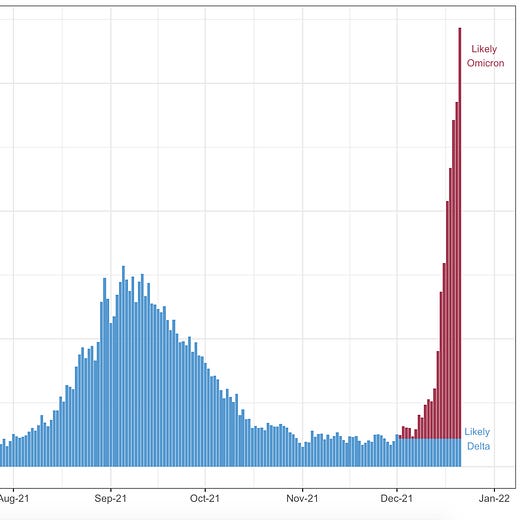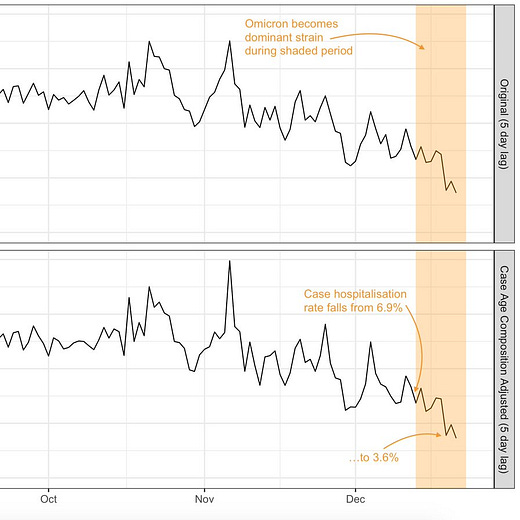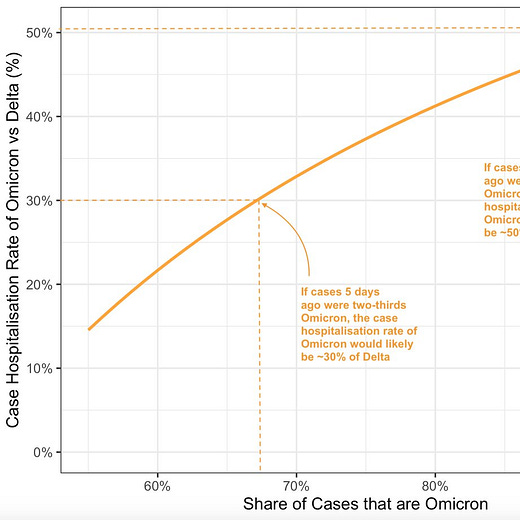Christmas Omicron update
Ho ho ho! Prepare to get sick.
Ah, Christmas! That magical time of year when Christians celebrate the birth of Jesus, Jews eat Chinese food and go to a movie, and Japanese people eat KFC with their significant other. And we all catch a pandemic plague.
This is probably the last Omicron update post I’m going to do, because in the next few weeks, it’ll be a bit moot — most of what we need to know about Omicron will be known, or at least not the kind of thing we’ll need to breathlessly (heh) check the news about. The reason is that the new variant is spreading insanely fast. Here’s Washington, D.C.:
There are still a few small voices out there crying for harsh containment measures, and of course you should still wear a mask inside, but something tells me that this one isn’t going to be contained. Tom Frieden, former head of the CDC, says this is one for the history books — even with a fairly large percent of our populace either vaccinated or bearing immunity from a prior infection, Omicron is spreading “as fast as measles in a non-immune population”. And measles is the most contagious disease hitherto known. The question of whether we should “let ‘er rip” is a bit beside the point — by the time our authorities decide what to do, it will already have ripped.
That’s the bad news. So…what’s the good news?
The first piece of good news is that vaccine boosters offer substantial protection against Omicron. Studies are showing that a third dose of mRNA vaccine (Pfizer or Moderna) restores a substantial amount of immunity. A booster reduces the risk of severe disease by about 80%. Part of that is because boosters activate T-cell immunity, which confers protection even after antibody levels wane (Here’s a cool paper explaining why scientists now think that vaccines activate T-cells that work against all varieties of Covid).
So get your booster right now if you haven’t gotten it already — remember that Covid vaccine shots take at least a week to start working, and Omicron is spreading insanely fast. In fact, some public health officials are now calling for booster mandates — a welcome change from a month ago.
The second piece of good news is that for better or worse, the Omicron wave could be over pretty soon. As epidemiologist Trevor Bedford explains in this thread, evidence from South Africa’s Gauteng province and from London suggest that Omicron waves shoot up and crash even more quickly than basic theory predicts.
But the question is how much damage will be done by that enormous, rapid wave. And here comes the third piece of good news: Omicron probably is less severe than previous strains of Covid.
In my previous Omicron posts, I warned people to be highly skeptical of the initial reports that Omicron was less severe. But new evidence is now coming in, and while we should still maintain a healthy degree of uncertainty, top experts are now agreeing that the data looks encouraging.
First, there was a study in South Africa that showed Omicron with a 50%-80% reduction in the probability of severe disease compared to Delta. Just eyeballing the shape of the Omicron wave there, it’s clear that a lot fewer people are going to die than in previous waves:
And the absolute number of ICU admissions in Gauteng is also way down from previous waves.
Now, that’s in a population with a significant amount of acquired immunity from pre-existing infection, so it’s possible that’s distorting the numbers here. But in New South Wales, an Australian state now suffering an Omicron outbreak, there was not much acquired immunity at all, and vaccination rates haven’t changed much between now and the Delta wave. And as Andrew Lilley notes in this excellent and careful thread, Omicron is also looking substantially less severe in NSW:
The same result is cropping up all over. In a roundup of the emerging evidence, Eric Topol notes that Denmark, England, and Scotland are all seeing the same pattern. And in fact, we may already know the reason for the reduced severity: Multiple studies now show that Omicron replicates much less efficiently in the lungs than either Delta or the original Covid:
This doesn’t mean that Omicron is down to “just the flu” levels of severity (though it could be pretty close, if the most optimistic estimates turn out to be true). But it’s not as severe as Delta, and with widespread vaccination, acquired immunity, and boosters, we may be able to ride this wave out without as many deaths as in previous waves.
(And although it’s definitely too early to bet on this, there’s an even more optimistic possibility. If acquired immunity to Omicron also provides good immunity against other, deadlier types of Covid, then Omicron’s contagiousness might simply crowd out those other versions completely. A much less severe Omicron that crowds out the more severe forms of Covid wouldn’t just kill fewer people; it would dramatically hasten the end of the pandemic. But don’t get your hopes up just yet.)
So that’s the good news for the short term. And in the medium term there are two other reasons for hope — both based on the strength of human science (and American science in particular).
First, a pan-sarbecovirus vaccine — i.e. a supervaccine that works against ALL strains of Covid — may now be in our hands. The first such vaccine candidate, created at Walter Reed Army Institute of Research, just passed its Phase 1 trials. Phase 2 and 3 will take months more, unfortunately. But we may soon have a weapon that will allow us not just to ride out the pandemic, but to defeat endemic Covid as well.
Actually, make that two weapons. Paxlovid, an antiviral drug from Pfizer that just got approved by the FDA for emergency use, is startlingly effective in combatting Covid (and should work just as well against Omicron). Of course, Paxlovid will require a dramatic ramp-up in production before we can get enough of it to significantly bring down Covid hospitalizations. But if this drug becomes widely available, then between treatments and vaccines, Covid won’t really be something to fear for any but the most vulnerable populations.
So although Omicron is burning through the U.S. population like a wildfire, there are plenty of reasons for optimism this Christmas season. A less severe form of the disease, combined with effective vaccines and treatments, means that we may be closer to the end of mass Covid death than it looked a month ago. Knock on wood. Fingers crossed.
As a coda, however, Covid’s economic impact will still reverberate around the world for a while. This is especially true because China is sticking doggedly to a “zero Covid” policy that almost all other countries have abandoned in the face of hyper-contagious new variants. That requires locking down whole cities whenever there’s so much as a whiff of Covid. And because the world depends so much on China to sustain its manufacturing supply chains, that means more disruptions in the works, potentially adding to the inflation problem. According to reports, Xi Jinping’s advisors are begging him to drop the “zero Covid” policy, but the supreme leader remains unmoved. This may vindicate my theory that Xi is not as competent an administrator as many believe, but it means continued economic headaches for both China and the world at large.
But let’s try not to think about that right now. Merry Christmas! May you and all your family and friends have a wonderful holiday, and avoid a trip to the hospital.










Prepare? I already GOT sick. The worst part wasn't the one day of feeling shit, it was being quarantined for the better part of the last 3 weeks.
Feels like there should be laxities on booster spacing given Omicron — was rejected from 2 clinics as my second dose was in July, making it 5 months, not 6 months. By the time I can boost seems the worst of this wave will be over.